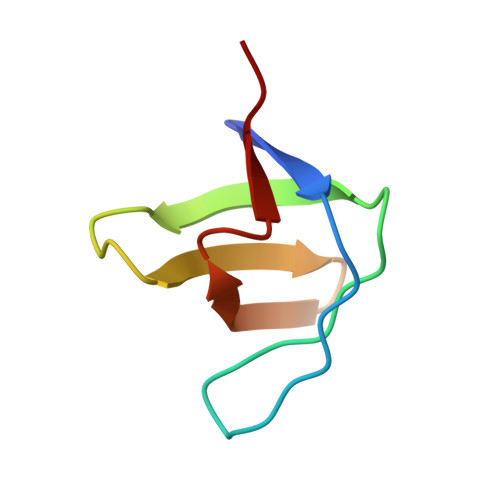The effect of a proline residue on the rate of growth and the space group of alpha-spectrin SH3-domain crystals.
Camara-Artigas, A., Andujar-Sanchez, M., Ortiz-Salmeron, E., Cuadri, C., Casares, S.(2009) Acta Crystallogr D Biol Crystallogr 65: 1247-1252
- PubMed: 19966410
- DOI: https://doi.org/10.1107/S0907444909038037
- Primary Citation of Related Structures:
3I9Q - PubMed Abstract:
alpha-Spectrin SH3-domain (Spc-SH3) crystallization is characterized by very fast growth of the crystals in the presence of ammonium sulfate as a precipitant agent. The origin of this behaviour can be attributed to the presence of a proline residue that participates in a crystal contact mimicking the binding of proline-rich sequences to SH3 domains. This residue, Pro20, is located in the RT loop and is the main contact in one of the interfaces present in the orthorhombic Spc-SH3 crystal structures. In order to understand the molecular interactions that are responsible for the very fast crystal growth of the wild-type (WT) Spc-SH3 crystals, the crystal structure of a triple mutant in which the residues Ser19-Pro20-Arg21 in the RT loop have been replaced by Gly19-Asp20-Ser21 (GDS Spc-SH3 mutant) has been solved. The removal of the critical proline residue results in slower nucleation of the Spc-SH3 crystals and a different arrangement of the protein molecules in the unit cell, leading to a crystal that belongs to the tetragonal space group P4(1)2(1)2, with unit-cell parameters a = b = 42.231, c = 93.655 A, and that diffracts to 1.45 A resolution. For both WT Spc-SH3 and the GDS mutant, light-scattering experiments showed that a dimer was formed in solution within a few minutes of the addition of 2 M ammonium sulfate at pH 6.5 and allowed the proposal of a mechanism for the nucleation and crystal growth of Spc-SH3 in which the Pro20 residue plays a key role in the rate of crystal growth.
- Departamento Química-Física, Bioquímica y Química Inorgánica, Universidad de Almería, Carretera Sacramento, Almería 04120, Spain. acamara@ual.es
Organizational Affiliation:

















